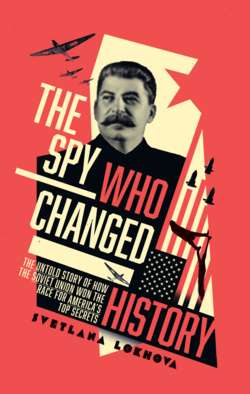The Spy Who Changed History: The Untold Story of How the Soviet Union Won the Race for America’s Top Secrets

Реклама. ООО «ЛитРес», ИНН: 7719571260.
Оглавление
Svetlana Lokhova. The Spy Who Changed History: The Untold Story of How the Soviet Union Won the Race for America’s Top Secrets
Copyright
Dedication
Epigraph
Maps
PREFACE
INTRODUCTION
1 ‘SON OF THE WORKING PEOPLE’
2 ‘WE CATCH UP OR THEY WILL CRUSH US’
3 ‘WHAT THE COUNTRY NEEDS IS A REAL BIG LAUGH’
4 ‘AGENT 001’
5 ‘A NICE FELLOW TO TALK TO’
6 ‘IS THIS REALLY MY MOTHERLAND?’
7 ‘QUESTIONABLE FROM CONCEPTION’
8 ’THE WILY ARMENIAN’
9. WHISTLE STOP INSPECTIONS
10. GLORY TO STALIN’S FALCONS
11. BACK IN THE USSR
12. PROJECT ‘AIR’
13. ENORMOZ
14. MISSION ACCOMPLISHED
POST-SCRIPTUM
APPENDIX I
APPENDIX II
FOOTNOTES. Introduction
1 ‘Son of the Working People’
2 ‘We Must Catch Up or They Will Crush Us’
4 ‘Agent 001’
5 ‘A Nice Fellow to Talk To’
6 ‘Is This Really My Motherland?’
7 ‘Questionable from Conception’
8 ‘The Wily Armenian’
9 Whistle Stop Inspections
10 Glory to Stalin’s Falcons
11 Back in the USSR
12 Project ‘AIR’
13 ENORMOZ
14 Mission Accomplished
NOTES. Abbreviations
Preface
Introduction
1 ‘Son of the Working People’
2 ‘We Must Catch Up or They Will Crush Us’
3 ‘What the Country Needs Is a Real Big Laugh’
4 ‘Agent 001’
5 ‘A Nice Fellow to Talk To’
6 ‘Is This Really My Motherland?’
7 ‘Questionable from Conception’
8 ‘The Wily Armenian’
9 Whistle Stop Inspections
10 Glory to Stalin’s Falcons
11 Back in the USSR
12 Project ‘AIR’
13 ENORMOZ
14 Mission Accomplished
Post-scriptum
INDEX
ACKNOWLEDGEMENTS
About the Author
About the Publisher
Отрывок из книги
To my father for his unending love, help and support.
Proverbs 22:6
.....
Sultanov arrived in Shusha on 10 February 1919, but the Armenians refused to submit to him. On 23 April, in Shusha, the fifth Congress of the Armenians of Karabakh declared ‘inadmissible any administrative program having at least some relationship with Azerbaijan’.35 In response, with the full connivance of the British and American officials now present in the region, Sultanov embargoed any trade with Nagorno-Karabakh, causing a famine. At the same time, irregular Kurdish-Tatar cavalry troops under the leadership of his brothers killed Armenian villagers at will. On 4 June 1919, the Azerbaijani army tried to occupy the positions of the Armenian militia and the Armenian sector of the city by force. After some fighting, the attackers were repulsed, until, under promises of British protection, the Azerbaijani army was allowed to garrison the city. According to the National Council of the Armenians of Karabakh, Sultanov gave direct orders for massacres and pogroms in the Armenian neighbourhoods, saying: ‘you can do everything, but do not set fire to houses. Houses we need.’36
The foreigner’s decisive intervention in local affairs added a new level of confusion to an already complicated situation. The local oil industry was too valuable a prize for anyone to ignore. The area around Baku was strategically precious. Since 1898, the Russian oil industry, with foreign investment, had been producing more oil than the entire United States: some 160,000 barrels of oil per day. By 1901, Baku alone produced more than half of the world’s oil.37 There were already millions of dollars of foreign capital sunk into the derricks, pipelines and oil refineries, and now it was all up for grabs. Every city, indeed seemingly the whole country, was the pawn of foreign powers. Shumovsky had seen the British arrive first, to be kicked out by the Turks, only to return later, while each time their local proxy allies set about massacring the innocent inhabitants who were unlucky enough to be born on the wrong side. He perceived this not just as a civil war of Reds versus Whites, but also as an embodiment of the worst excesses of imperialism and deep-seated ethnic hatred – precisely the cataclysm described in the leaflets he had distributed in Kharkov. Only the unity of the working people could fight off the massed forces of imperialism descending on Russia.
.....